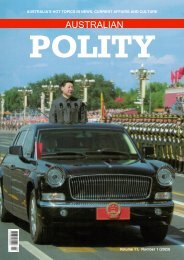CHINABUSINESS ETHICSEXPOSED/ KEVIN ANDREWS36 Australian Polity
It is unusual for the blatant pursuit of profits at theexclusion of human rights to be expressed nakedly.Businesses employ a phalanx of public relationsadvisors to script careful responses for their ownersand executives. Sometimes they obfuscate, like theclothing chains that refuse to disclose whether they aresourcing textiles from Chinese slave labor camps. Othertimes they feign sympathy for the oppressed, but protestthere is little they can do. They may even respond thattheir economic activity will help the afflicted people inthe longer term. Memos are written and lines carefullycrafted to respond to any possible question.So, it is truly shocking when a business owner downrightrejects human rights as occurred recently with thebillionaire part-owner of the NBA Golden State Warriorsteam, Chamath Palihapitiya. Clearly Mr Palihapitiya hadnot read the PR memo before he waded into a friendlyAmerican podcast.“Nobody cares about what’s happening to the Uyghurs,okay?” Palihapitiya told the broadcast host. “You bringit up because you care, and I think it’s nice that you care.The rest of us don’t care,” he said frankly. “And I’m sorry ifthat’s a hard truth to hear, but every time I say that I careabout the Uyghurs, I’m really just lying...” To emphasise hispoint, Palihapitiya, a former Facebook executive added:“I’m just telling you a very hard, ugly truth. Of all the thingsthat I care about, yes, it is below my line.”games have been played there, and many players earnsignificant sporting wear advertising revenue from thecountry. When Nike was criticised by the CCP afterexpressing concern about forced labour, it retreatedfaster than a return toss down the court. The companyeven lobbied Congress to water down the anti-forcedlabour bill. NBA stars like LeBron James pontificate aboutall manner of alleged injustice, but quiver at the slightestcriticism from the CCP. The one stand-out, Boston Celticsplayer Enes Kanter has repeatedly called out the humanrights abuses – and the hypocrisy of the league. Heposted ‘When the NBA says we stand for justice, don’tforget there are those who sell their soul for money andbusiness like @chamath. . . When genocides happen,it is people like this that let it happen. Shame.’ But therelationship soured when the Houston Rockets generalmanager, Daryl Morey tweeted ‘Fight for freedom standwith Hong Kong’, leading to a television ban by the stateownedChina Central Television network. The NBA wasestimated to lose some $400 million in revenue. Theirony was that the Houston Rockets had been at theforefront of involvement with China, especially throughthe popularity of its former star player, Yao Ming. For itspart, the NBA has held firm, even showing images ofplayers with the words ‘vote’ and ‘liberty’ printed on theirt-shirts, unlike Tennis Australia which initially censoredt-shirts at the Australian Open which had printed on them‘Where is Peng Shuai’ – a reference to the ‘disappeared’Chinese player.Calling concerns about the human rights abuse of theUyghurs ‘a luxury belief’, the Sri Lankan born, CanadianAmerican investor doubled down, saying it was ‘deplorable’to criticise China’s human rights record. Clearly statinghis priorities, he added: ‘I care about the fact that oureconomy would turn on a dime if China invades Taiwan.’As an investor in special purpose acquisition companies,a vehicle that enable private companies such as VirginGalactic to go public with less regulatory scrutiny, MrPalihapitiya, became sufficiently wealthy to invest inthe sporting league. He is also a major donor to theDemocratic Party.Facing an avalanche of criticism, Palihapitiya backtracked.‘As a refugee, my family fled a country with its own humanrights issues so this is something that is very much apart of my lived experience. To be clear, my belief isthat human rights matter, whether in China, the UnitedStates, or elsewhere. Full stop.’ Except he had alreadyclaimed ‘every time I say that I care about the Uyghurs,I’m really just lying...’ There is also a twist to the fleeingrefugee story. At the age of five, Palihapitiya movedwith his family to Canada where his father was postedas High Commissioner. The family applied for and wasgranted refugee status five years later when the postingconcluded.NBA sponsors such as the sporting goods giant Nike areenthralled at China. As many as 800 million Chinese areclaimed to watch the Association’s matches; pre-seasonPalihapitiya attempted to claim some equivalence withthe situation in the US: “Look at the number of black andbrown men currently incarcerated for absolutely ridiculousAustralian Polity 37





